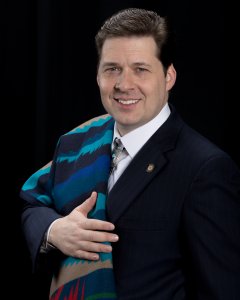

All three incumbent Republicans in Oklahoma State Senate runoffs lost their seats Tuesday night, bringing the total number of Senate GOP incumbents who have lost this election cycle to four.
Sens. Larry Boggs (R-Wilburton) and Paul Scott (R-Duncan) failed to maintain primary leads over challengers Warren Hamilton and Jessica Garvin, respectively. In Senate District 17, Sen. Ron Sharp (R-Shawnee) lost to former Rep. Shane Jett, who finished ahead of Sharp in the June 30 primary.
In open seat Republican runoffs, George Burns won Senate District 5 and Cheryl Baber took Senate District 35.
All the five Senate seats up for GOP nomination on Tuesday will move to a primary election, as newly-minted Republican candidates will face four Democrats and one Libertarian on Nov. 3.
Online results from the Oklahoma State Election Board are unofficial.
Not so Sharp
In the June 30 primary election, northeast Oklahoma incumbent Republican Sen. Wayne Shaw (R-Grove) lost to Blake “Cowboy” Stephens. Now with the defeats of Boggs, Scott and Sharp, the Senate GOP Caucus will feature numerous new faces.
Going into Tuesday, Sharp faced an uphill battle for retaining his seat. He ended the June 30 primary 11 points behind Jett’s 44 percent support. He failed to make up the difference, and Jett ultimately earned 59 percent of Tuesday’s vote.

In recent years, Sharp had been a vocal critic of Epic Charter Schools, most recently accusing the group of election fraud. Sharp has served Shawnee-area SD 17 for eight years.
Jett, for his part, is no stranger to the Oklahoma Legislature, having served in the House for five years in the late 2000s. When he left in 2010, it was to make two unsuccessful bids for Oklahoma’s 5th Congressional District. He recently sued the Citizen Potawatomi Nation, alleging he was wrongfully fired after he opposed a local mask mandate.
Sharp’s campaign suffered from a series of dark-money mailers, alleging Sharp was connected to convicted rapist and former movie producer Harvey Weinstein, and that during his time in office he forced teachers to join labor unions. Sharp characterized both of these claims as “absolutely false,” and expressed concern that at least one of the groups behind the mailers supported Jett in the primary.
Jett will face Libertarian Greg Sadler in the general election to claim the seat.
Abortion abolitionist defeats Larry Boggs
In the southeastern portion of the state, Warren Hamilton emerged victorious from perhaps the most heated race of the August elections, beating incumbent Sen. Larry Boggs by just more than 200 votes.

The conflict in SD 7 was epitomized in a Haskell County Republicans meeting where Boggs and Hamilton clashed over the issue of abortion. The conflict, which each man attributed to his opponent, resulted in a police report (the DA declined to file charges) and a series of narratives from local Republicans recounting the interaction from their perspective.
Hamilton, who earned 42 percent of the June vote to Boggs’ 46 percent, describes himself as an abortion abolitionist. The most successful of half a dozen of abolition candidates who challenged incumbents in June, Hamilton believes Oklahoma should outlaw and criminalize abortion. His belief that Boggs has not done enough to end abortion in Oklahoma was the main message of his primary and runoff campaign.
Boggs, who described himself as “100 percent pro-life” has represented SD 7 since 2012, and 2020 marks the first election cycle in which he has faced a fellow Republican in the primary. Before the runoff, Boggs received the vast majority of endorsements in the race, including from U.S. Sen. Jim Inhofe (R-OK) and Gov. Kevin Stitt.
Hamilton will face Democrat Jerry Donathan, a military veteran and retired munitions plant employee in the general election.
Around 10 p.m. Tuesday, Boggs released a statement about his defeat.
“I have been honored to represent the people of SD 7 for eight years, and I will always be grateful for the opportunity to serve. Despite today’s outcome, my commitment to southeast Oklahoma will never waiver,” Boggs said. “This primary has been competitive, and sometimes contentious, but I hope every voter will support the best candidate in November.”
Scott nearly won primary, but loses runoff
In June, incumbent Sen. Paul Scott missed the nomination in SD 43 by just 0.1 percent of the vote. However, Garvin overtook him Tuesday, earning the nomination with 51 percent of the GOP vote.

Before the runoff, Scott told NonDoc he didn’t see a runoff election as necessary.
“The race wasn’t close at all. I had a pretty decisive victory,” Scott said. “So now, it’s gonna cost taxpayers for that runoff. It was a decisive victory to start with, but with our laws, it’s gonna cost the state of Oklahoma another election.”
Scott campaigned heavily before the runoff, maintaining a website called TruthAbourtGarvin.com, which he used to accuse his Republican opponent of secretly being a “liberal political insider” who Democrats were switching parties to vote for. Garvin denied that characterization.
Scott did not escape criticism in the race, as Garvin alluded to a series of incidents over the past few years, including a prank on a female colleague, that she felt painted the Duncan-area district in a bad light.
In November, Garvin will face Democrat Terri Reimer, who only began campaigning this month.
End to a bitter fight in Tulsa Senate seat primary
The runoff race in SD 35, from which Cheryl Baber emerged victorious Tuesday, has been particularly contentious. Baber turned to claiming her opponent, Kyden Creekpaum, was hiding liberal values from voters ahead of the runoff. In response, Creekpaum defended himself from what he called “wholly, clearly false political advertising,” partially by highlighting that the organization responsible for running Baber’s campaign, Tomahawk Strategies, LLC, is currently involved in a libel lawsuit.
SD 35, which is currently represented by term-limited Sen. Gary Stanislawski (R-Tulsa), covers south Tulsa. In the primary for the seat, Creekpaum led with 43 percent of the vote, while Baber earned 34 percent.
On Tuesday, Baber defeated Creekpaum with 53 percent of the vote. Stanislawski endorsed Baber ahead of the runoff.
In the November general election, Baber will face Democratic nominee Jo Anna Dossett, sister of Sen. J.J. Dossett (D-Owasso).
Burns on fire
In far southeastern Oklahoma, George Burns defeated his opponent Justin Jackson by just 22 votes in the runoff for SD 5, according to unofficial results.
Jackson finished the June primary 300 votes behind Burns, who was the top vote-getter at 38 percent.
The seat, which Burns will compete with Democrat Randy Coleman for on Nov. 3, spans five counties in the southeastern corner of Oklahoma. SD 5 has been represented by Sen. Joseph Silk (R-Broken Bow) since 2014, who left this election cycle to unsuccessfully challenge U.S. Rep. Markwayne Mullin (R-OK2) in eastern Oklahoma’s 2nd Congressional District.
The primary between Burns and Jackson featured an often-tense competition over who was the most supportive of President Donald Trump. Burns likened himself to the president, promising to “root out corruption” at the State Capitol” and “get the job done,” phrases that mirror Trump’s campaign rhetoric. Jackson, who has been a Trump supporter since 2015, wrote a song entitled “Trump Train,” lauding the president and told NonDoc he related to Trump’s business background.
(Update: This article was updated at 10:30 p.m. to include a statement from Sen. Larry Boggs.)





















